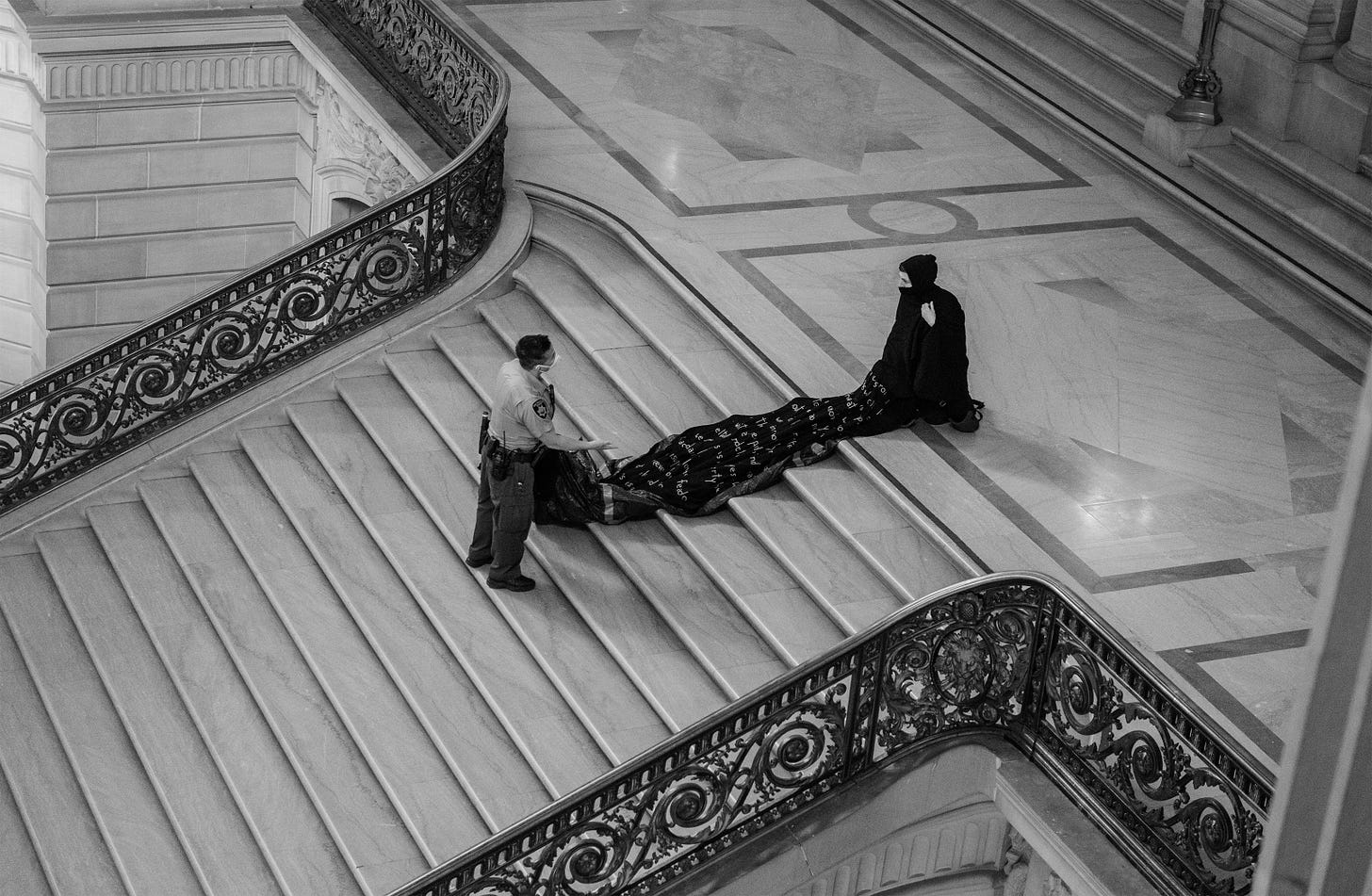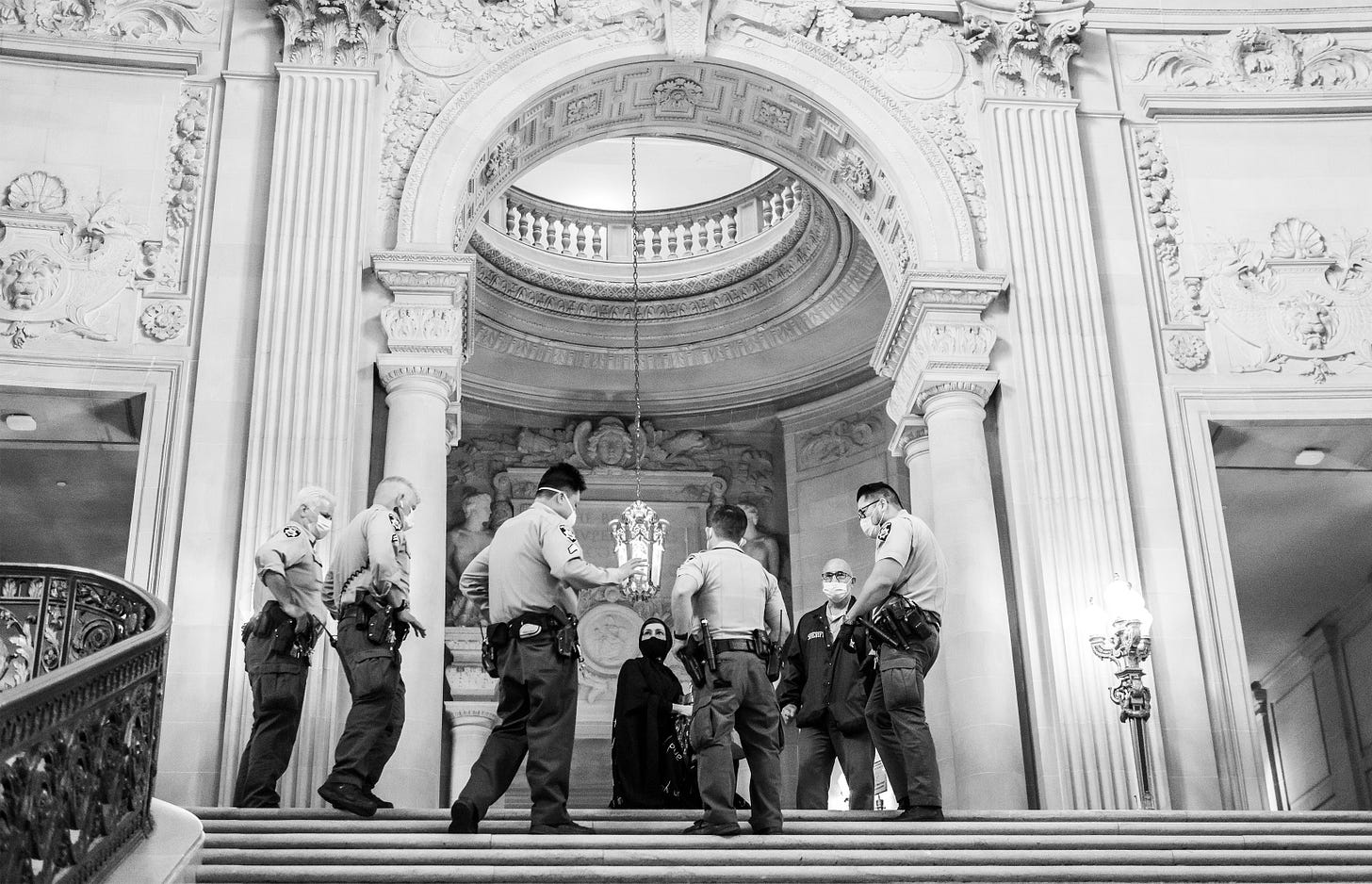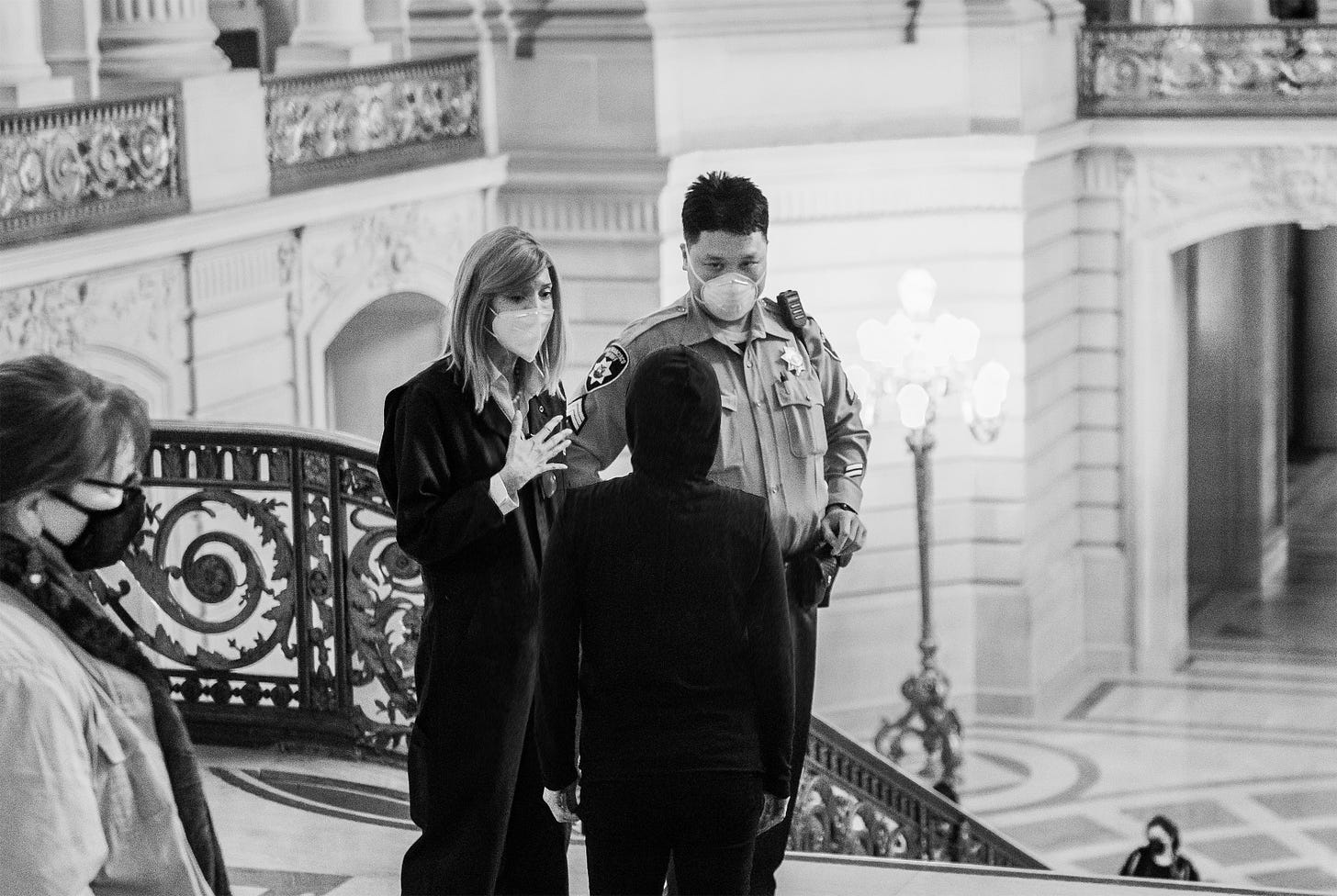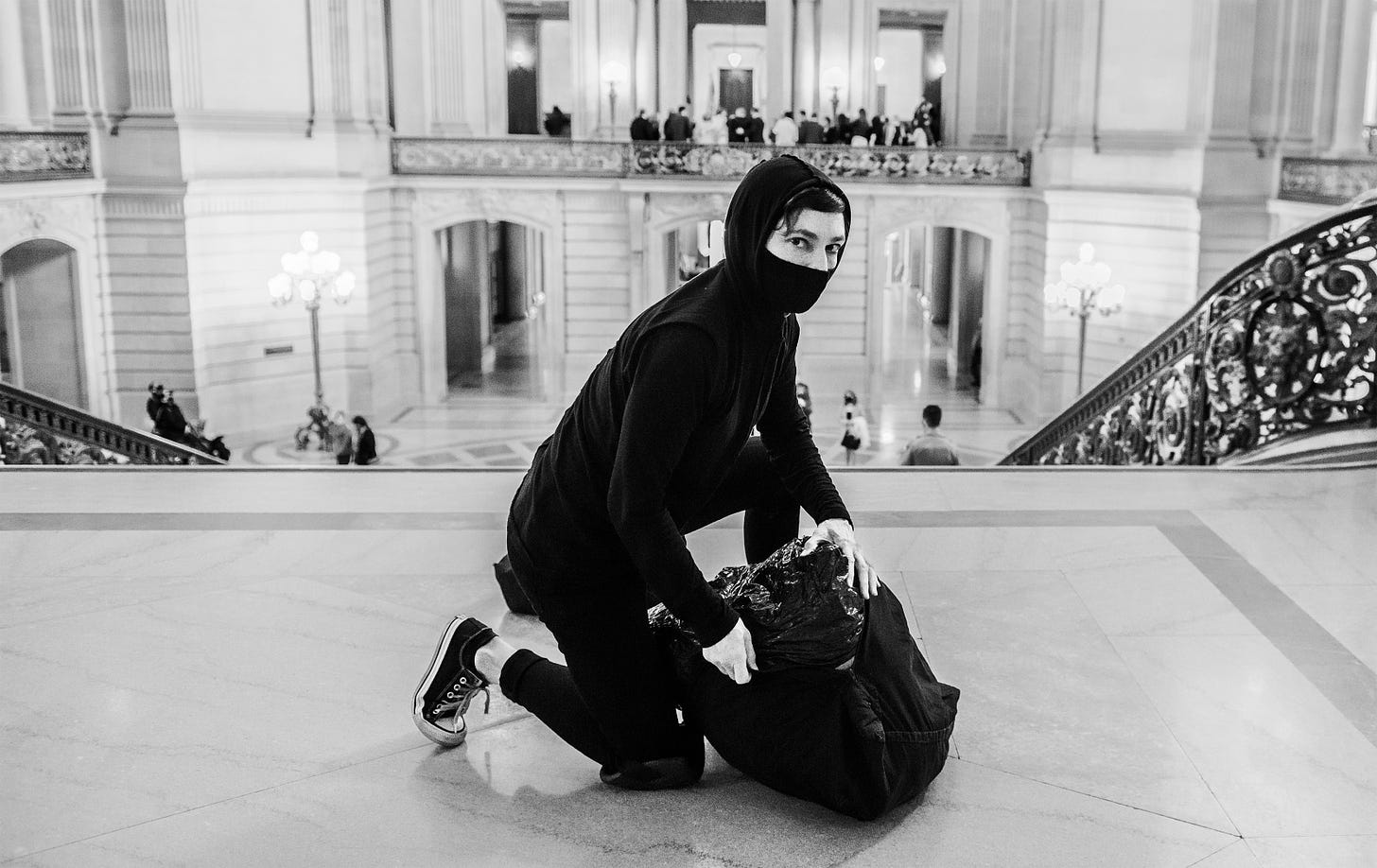March 2nd, 2022, San Francisco City Hall, 1 Dr. Carlton B Goodlet Plaza, CA
Photographs by Chris Tuite
This essay coincides with an article written in the San Francisco Chronicle by Lilly Janiak.
Modeled in the Beaux Arts style, and rebuilt after the 1906 earthquake just in time for the Panama-Pacific International Exposition, San Francisco City Hall is one of the most beautiful buildings in California. The dome is higher than that of the U.S. State capital and I have been inside this grand public venue many times in my life; mostly as a caterer. Each time I’ve worked there, I’ve been awed by the neoclassical structure, sumptuous marble floors, ornate balustrades, and even the old wooden doors and polished handles in the bathrooms. Every detail of the building is perfected.
That afternoon, as I entered the front doorway, and walked through security, I felt calm and nervous, the two feelings running side by side. I was also surprised by the number of people getting married on a Tuesday afternoon. I knew that unfurling my cape at the top of the steps would be a dramatic moment and I had to pick just the right moment to get it down quick. I was a little concerned about disturbing others who were photographing their wedding ceremonies, and my “being in the way.” But I also had a “f#*k that” voice underneath. Both voices came together. An anxiety began to rise from my belly.
I wondered at the meaning of public space in general and inside government institutions particularly. Rob Reiter, the S.F. City Hall administrator had made a confusing statement about their policy in the Chronicle. “The interior of City Hall, including the Grand Staircase, is not a public forum like the sidewalk in front of City Hall ….and any unauthorized and unscheduled performance inside the building is prohibited to allow maximum access to public spaces for members of the public.”
At 3:30, I climbed up the steps, crouched down behind the banister, and waited for a couple to descend the stairs. As soon as they got to the bottom, I went to the center of the imposing stairwell, pulled the cape out and unfurled my long black mantle down the marble flight. I stayed focused. I was about to get under it, and kneel, but not ten seconds passed before a guard was behind me grabbing my cloak.
Immediately, I became angry. I told him to, “Let go of my cape.” Within three seconds, another cop was there, grabbing the side of my cape with aggressiveness. I yelled at him to “Stop touching my cape.“ I heard my voice echo out into the open and cold chamber. Suddenly there were six or seven cops surrounding me. Each one gave me reasons as to why I couldn’t be there as I pulled my cape closer to me with rapid speed. The thick wool felt like a protection against them. Oddly, I stayed low to the ground as a way to take cover. They finally let go.
I told them that City Hall was a public venue, and that if the general public could take wedding photos there, or have fashion shoots, then I could be there as well.
One said, “You can’t have any banners here.”
I said, “It’s not a banner, it’s a cape.”
He said, “It doesn’t matter, you can’t protest here.”
I said, “This is not a protest.”
Another cop said, “Looks like a protest.”
Another officer said, “Your cape doesn’t look celebratory.”
I yelled, “What’s that got to do with anything. You’ve made a lot of assumptions.”
After some tense arguing, one of the officers said to me, “You’ve got three choices.”
“ONE, you can come with us down stairs to the basement, we’ll look at what you have, and decide if it’s appropriate.”
“TWO, you can go outside on the steps of City Hall and do your protest there.”
“THREE, if you resist either of these suggestions, you’ll be arrested.”
With clarity and emphasis, I said, “I’m staying.”
Then another officer said, “You WILL be arrested if you don’t decide on the first two.”
I felt so much defiance towards them that I did not feel the fear or sadness that was underneath. We began to argue. Politicians prefer “protesters” to be outside where anything that might be uncomfortable for them can be dismissed. But if one is on the inside of the building, then it is harder for elected officials to turn away. I was going to resist for as long as I could. San Francisco was supposed to be a progressive city, but the swift overpowering of my action demonstrated just how much hyper-vigilance there is around any form of social/political commentary. I was shocked by the lightning speed with which these cops had surrounded me.
In the meantime, I noticed that my photographer wasn’t allowed to ascend the staircase, and I was now isolated. I looked towards him. Everyone was being kept away. This is what cops do, and they know how to do it well. My arguments fell on deaf ears.
After a little while, one of them said, “Okay, listen, we’ll have the building manager come over and look at what you have. Then we’ll decide what to do.”
I didn’t trust it, but it gave me pause. I took a big breath in and I saw my friend Kitty. I thought how did she get here?
The manager arrived and asked me to open my cape onto the floor. Now I felt cornered. All these cops were going to look at my letter and judge it. I felt a tension come into my gut. At the same time, I was determined to negotiate as best I could, and I didn’t have much of a choice. I needed to be smart, not reactive. Thus, I began to re-open the cape onto the floor, and suddenly I felt exposed. I kept myself turned away from looking at it and I blocked the content from my mind. Everyone stood around and looked at the black shape on the ground. I don’t know how many of them actually read the letter to my dad, but there it was, wide open for everyone to look at. (See my essay here about looking/seeing.)
I saw the general manager read my cape, and when she finished, she said she was sorry for my history. Honestly, I didn’t feel it from her. You know… when someone actually feels something, their face says everything. She didn’t have it. She was looking at me with a pitying stare. I could feel her distancing herself from me.
Her and an officer spoke to each other, deciding on what to do. Kitty came over and said she had sneaked up by elevator. I was so relieved to see her. It gave me some space and strength, my nerves calmed. After the cop and the manager discussed things, they said I could stay for a little while. I said, “I’d like to stay for an hour.”
She said, “Five minutes.”
I thought, are you kidding me?! Five. Minutes. That amount of time was a slap in the face. By then, my anger had started to give way to a kind of lesser collapse. I suspect my body knew the score. The thought of struggling against six to eight cops again was not even possible. It didn’t feel like I had any alternative, but I insisted on ten minutes.
She said, “Okay, ten minutes.”
Begrudgingly, and yet too, with some satisfaction, I lifted my cape out over the steps, got under it, and began my meditation. While I was there, a sadness overcame me. It was too much to have those feelings right then, but I was suddenly subjected to them. I gulped at the air, and began to weep. My friend Sharon approached me and said, “Do you want to move your cape back a little.” I was grateful to her and I saw some of my other friends there too. I came back to my breath, and my tears slowed.
“Yes, let’s move it back.” I said. They helped me move my cape down the stairs so that the letter was more legible.
I stayed still for the most part. I stayed with my breath. I tried to let go of any outcome.
I didn’t watch the time, I knew it would be too short, but it was something. It felt like a small victory.
After my time was up, the manager and the police officer came and stood over me. Our bodies convey a lot of emotional information. Neither of them had bent down to speak with me, not like the cop in Fresno which I will write about later.
They stood over me and said, “It’s time for you to go.”
I said, “Okay.”
I wanted them to step back. They didn’t. They said it again, and I waited for them to step back a little. Were they going to lord over me? I stared at them. Finally, they took a step back. I began to undo the buttons on my cape, and come out from under it. My friend Emily came over and helped me fold up my 12 foot cloak. I had so many mixed-up feelings as I walked down the steps leaving City Hall. My heart was up in my throat; I felt disappointment, but also a kind of settling. My small battle had gotten me precious minutes.
While Lily Janiak was interviewing me, a woman who had seen the cape inside City Hall approached me and said with a smile, “That looked like an interesting art work you had. What was it about?” I was completely thrown back, befuddled by her smile and inquiry. I felt stunned by my inability to talk and I felt my face harden though I didn’t mean it. I searched for words and didn’t find any. Feeling helpless, I searched my bag for a card to give her, and couldn’t find one. She looked at me with consternation and, then she walked away. Just a moment in passing and I had made someone who was curious feel slighted. It didn’t feel good. I think this happens a lot when we try to communicate to each other. I think this happens when we can’t slow down or we feel defended inside.
The next day, I thought about how things get communicated. I wondered what would have happened if I had been an African American man or woman. What would have happened at City Hall?
Two days later, my friend Vee sent me a text from her friend (Eula Janeen Wyatt) who had witnessed the whole event. Here is what she wrote.
“I got there early and was watching all of the exotic brides on the stairs. When she arrived at the top of the stairs and started to unfurl her black cape, it was like a shot was fired as eight guards went running up the stairs from all directions. She immediately crouched down on her knees in place as they surrounded her. Two of them came down the steps and made all the brides leave, and kept the rest of us from coming up the steps. After several minutes a woman with a clipboard came walking out, and it looks like she told the guards that it was OK. They all stepped back. She stood up, and unfurled her cape down the steps. Later, they allowed us to walk up the steps near her and take photographs. And there was extreme silence throughout the rotunda for the next 10 minutes. Then, they notified her the time was up. She quietly stood up, rolled up her cape and left. The brides in white appeared from the wings and marched back up the steps. I don’t think it could have been staged any more dramatically. “
I was happy to see that only ten minutes had made an impact. I continue to be deeply grateful to my close friends who’ve consistently supported me, and that Lily Janiak wrote her article in the San Francisco Chronicle. I’m finding faith that my gestures are not completely in vain.




















Your "gesture" is not "in vain" at all, and probably has more of an impact than you'll ever know. This post about what the experience was for you, from the inside, is yet another opportunity for your "audience", the "public", those who stop long enough to bear witness, to learn and grow and evolve toward a culture of non-violence. Thank you!
Suspenseful and honest. Thank you for your deep and brave practice, and for writing eloquently about it.